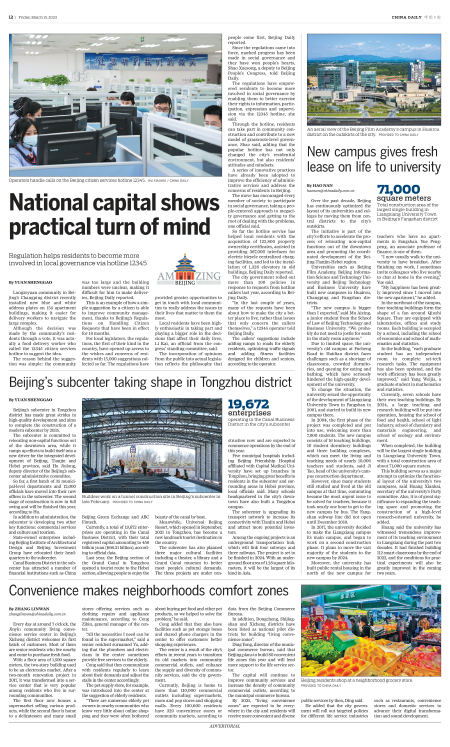
Beijing residents shop at a neighborhood grocery store.
Every day at around 7 o'clock, the Jinyin community living convenience service center in Beijing's Xicheng district welcomes its first batch of customers. Most of them are senior residents who live nearby and come to purchase fresh food.
With a floor area of 1,500 square meters, the two-story building used to be an electronics market. After a two-month renovation project in 2017, it was transformed into a service center that is very popular among residents who live in surrounding communities.
The first floor now houses a supermarket selling various products, while the second floor is home to a delicatessen and many small stores offering services such as clothing repairs and appliance maintenance, according to Cong Zibin, general manager of the center.
"All the necessities I need can be found in the supermarket," said a senior resident surnamed Yu, adding that the plumbers and electricians in the center sometimes provide free services to the elderly.
Cong said that they communicate with residents regularly to learn about their demands and adjust the stalls in the center accordingly.
The pet supply store, for example, was introduced into the center at the suggestion of elderly residents.
"There are numerous elderly pet owners in nearby communities who know very little about online shopping and they were often bothered about buying pet food and other pet products, so we helped to solve the problem," he said.
Cong added that they also have facilities such as pet storage boxes and shared phone chargers in the center to offer customers better shopping experiences.
The center is a result of the city's efforts in recent years to transform its old markets into community commercial outlets, and enhance the supply and diversity of community services, said the city government.
Currently, Beijing is home to more than 110,000 commercial outlets including supermarkets, mom and pop stores and shopping malls. Every 100,000 residents have 329 convenience stores or community markets, according to data from the Beijing Commerce Bureau.
In addition, Dongcheng, Shijingshan and Xicheng districts have been listed as national pilot districts for building "living convenience zones".
Ding Yong, director of the municipal commerce bureau, said that Beijing plans to build 80 convenient life zones this year and will lend more support to the life service sector.
The capital will continue to improve community services and increase the density of community commercial outlets, according to the municipal commerce bureau.
By 2025, "living convenience zones" are expected to be everywhere in the city and residents will receive more convenient and diverse public services by then, Ding said.
He added that the city government will roll out targeted policies for different life service industries such as restaurants, convenience stores and domestic services to advance their digital transformation and sound development.
zhanglinwan@chinadaily.com.cn

